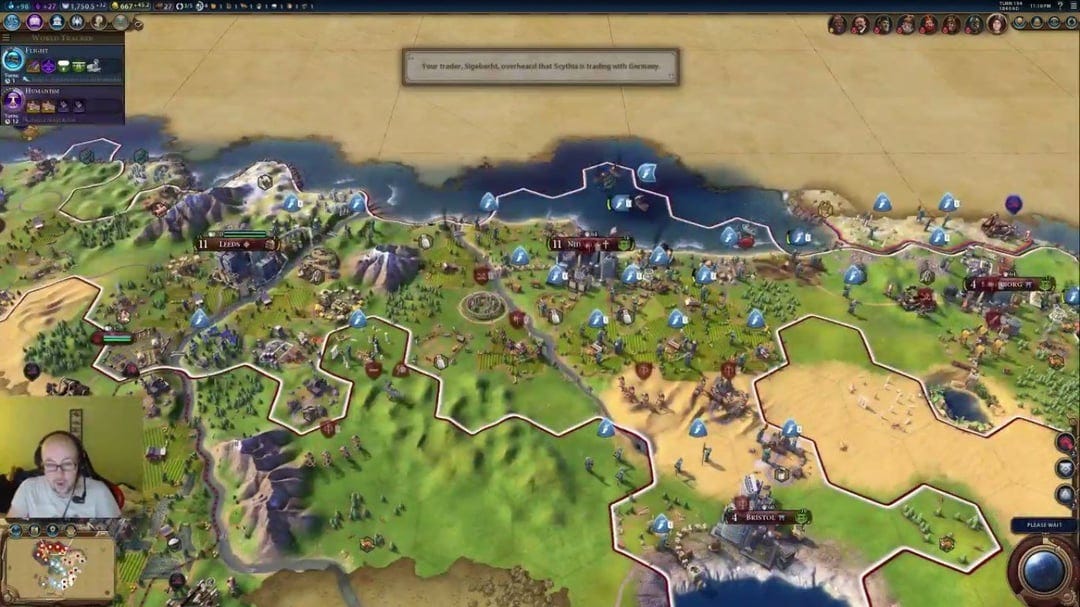On Towards the Stars: Executing a Religious Victory
[This post is part of a larger strategy guide for Civilization 6]
Ah, religion. The black sheep of the civ 6 victory slate. In all my many hours/years of civ 6, I have seen a religious victory in a multiplayer game exactly once. It happened in the first year of the game's release, before any of the expansions had come out, before any of us really understood the game. And it happened more or less by accident — I was able to convert the final city because my opponent didn't fully understand all of the rules of the game, and he could have easily stopped me if he knew how.
Religious victories are hard because they require a ton of resources to pull off, but still more or less have to be a surprise outcome. It's very easy to stop religion, and as a result you basically have to spend the whole game pretending to be doing something else. Which in turn is very difficult to do, because spreading religion as a mechanic is very very obvious.
Religion is also just, like, the least fun way to play in my mind. So if you're signing up for a religious victory, good luck.
When to go for a religious victory
Never?
A bit less tongue in cheek: the best time to go for a religious victory is when you realize that your passive religious growth has mostly already covered a huge part of the map. Religious Enhancer beliefs like Itinerant Preachers or Scripture can make this happen more directly. A reasonable approach is to make a religion at the beginning of the game and then mostly play normally, and then pick your head up around the Industrial Era to see how your religion is doing. If it's doing well, great! Invest a bit more to see if it's a viable win condition.
There's a sense in which playing for religion is a bit like playing a diplomacy game. You need to convince the table that everyone else is a threat while you slowly pick up momentum, until suddenly it's too late. Of course this should be pretty easy — you likely won't be a serious threat at all, because investment in spreading religion likely means you'll be much worse at everything else.
The best Civs for a religious victory are those that have bonuses to faith (Arabia, Russia, Spain), or have explicit religion-oriented boosts (India, Spain again, Byzantine, Poland). Note that faith as a resource is fairly valuable even when you don't explicitly have a religion.
Exodus of the Evangelists
Because of the way religion and religious pressure works, the best time to spread a religion is in the first few dozen turns of the game. A single missionary charge is enough to flip an entire city; a single missionary can flip an entire empire. And because new cities retain the religion of the source city, your religion will naturally grow as your opponents expand. There are few mechanics in civ that allow you to be as parasitic as religious spread.
Each city following your religion creates religious pressure on all cities within 10 tiles. If you're playing the long game, you want to skip some nearby cities and send your missionaries far afield. That way the cities that you skip in the middle will get double the pressure and will eventually convert without you doing anything.
So at the beginning of the game you want to send your missionaries as far as possible to convert as many cities as possible.
If you're playing a religious game, you should basically always pick Exodus of the Evangelists as your first Golden Age pick. It gives your missionaries more charges, and gives them more movement to go farther. Human players often won't pursue religion as intensely as AI players. This means you may have the ability to kill other religions before they really get started. A strong opening with Exodus can, in rare cases, set you up for a really early Medieval era victory — assuming, of course, that no one else really notices.
Faith economy
The backbone of any religious victory is your faith economy — how much faith are you generating, and what are you getting from it?
On the supply side, you obviously want as much faith as possible. More holy sites with high adjacency bonuses, slotting in the right faith generating cards and governors and governments, things kinda that.
On the demand side, you want to get the most bang for your buck possible. To be concrete: the cost of a missionary or apostle increases for each new one created, so you better find ways to make religious pressure cheaper if you want to win.
One good way to reason about this is by thinking about how much religious pressure each bit of faith gets you. By default a missionary has 3 charges and creates 200 units of religious pressure. So if a missionary costs 100 faith, you're buying 6 units of pressure per faith. If you get a mosque, each missionary gets an extra charge. Now you're buying 8 units of pressure per faith. If you get Hagia Sophia, each missionary gets an extra extra charge. Now you're buying 10 units of pressure per faith. If you switch to Theocracy, you get a 15% discount on faith purchases. Each missionary now only costs 85 faith, so you're effectively buying 12 units of pressure per faith. With the right buildings and wonders, you can dominate other religions by simply being able to out-spam everyone else for cheap.
The most faith efficient purchase in the game is an apostle with the Proselytizer promotion. Each charge eliminates 75% of the existing pressure on a city, which is often the equivalent of well over a thousand religious pressure units. The second most efficient is the apostle with the Translator promotion (triple strength for each charge), and third most is the Debater promotion (+20 combat strength)1. As you might expect, being able to select apostle promotions is really really important.
Unfortunately, unless Yerevan is in the game, you can't directly choose which promotion your apostle will get. There are 9 possibilities and you get 3 to choose from, so you'll only get one of the "good ones" a third of the time. But you can improve your odds. Upgrade Moksha to the "Apostles get a second free promotion" as soon as possible. While it won't guarantee that you get one of the three good promotions listed above, it increases your chances to nearly 60% per apostle. Turns out that a few targeted apostles with the right promotions can win you the game pretty quick.
Common mistakes: Religious Fanaticism
The big problem with investing heavily in a religious victory, especially in the early game when it is most effective, is that those investments could be better used elsewhere. In order to win religion, you need "religious pressure". Religious pressure is a secret resource that's kinda like tourism. It exists only to calculate the religious victory condition. You can't spend it on anything, you can't use it to ramp.2 But you need a lot of it to win. As with tourism, every hammer spent on improving religious pressure is one less spent on a builder, settler, trade route, wonder, or other district. Is the spend worth it?
If you're going for religion, your job is balancing the needs of your faith economy against the needs of your actual economy. This is really hard, and I don't think I've ever seen someone who can manage both effectively. Most often, I see religious players really start to fall behind by the industrial era — their cities may have a bunch of faith, but they used an extra district slot on a holy site and so don't have room for an IZ or commercial hub that could produce more hammers.
To be clear, a single minded focus on any civ mechanic is a losing strategy. That is especially true of faith/religion. But what makes religious victories exceptionally hard is that even with reasonably good balance, you will still fall behind.
I think most religious players need to proactively jump ahead before factories come online, just to maintain stasis. In my opinion, pre-industrial war is a very solid option, especially if you can time Grand Masters Chapel (buy units with faith) with Theocracy (unlocks a card that gives +4 strength to units fighting other units). Combined with Crusade (+5 strength against enemy cities following your religion) and the Oligarchic Legacy (+4 melee strength) cards, you can get a pretty crazy power spike.
Stopping religion: just, like, notice it's happening?
The other big problem with going for a religious victory is that it is very easy for other people to stop. Anyone can declare war at any time and start using their military units to kill your religious units. Each time a religious unit is killed, you lose religious pressure in all nearby cities.
Honestly, there isn't much you can do about this. This is part of why playing for religion is a bit like trying to go for a diplo victory — you need to have alliances and agreements that discourage other people from attacking your religious units, built on promises elsewhere in the game.
On the flip side, if you're trying to stop a religious victory from happening, you need to start killing your opponent's religious units immediately. Luckily this is very easy to do. Simply buy a scout or horseman and go to town. If you're really concerned about losing to religion — for example, a lot of cities are starting to convert due to passive pressure — you need to build apostles and inquisitors in one of the few cities that is still following some other religion. This too is not all that difficult, generally speaking. And if you find yourself in a rare situation where there's literally no other religion left, you probably deserve to lose.
Concluding Thoughts
In case it isn’t obvious, I don’t have a very high opinion of religious mechanics. I think that winning a religious victory is hard. Worse than that, it’s boring. People say that the biggest problem with Civ 6 is that the end game becomes a slog. This is true. The biggest problem with religion is that the whole game becomes a slog. Still, faith is useful, and I’ve used religious bonuses to drive culture and science victories. I think that is really the best way to play with the religious mechanics. At the least, it’s much more fun than spamming apostles.
This one is a bit harder to directly value because you have to factor in the odds of your apostle successfully killing someone else's units. These guys also potentially last the entire game, while the others become much less useful after running out of charges.
Sorta. You do get some bonuses for flipping cities and population to your religion, but it's not a lot and rarely worth the extra investment.



